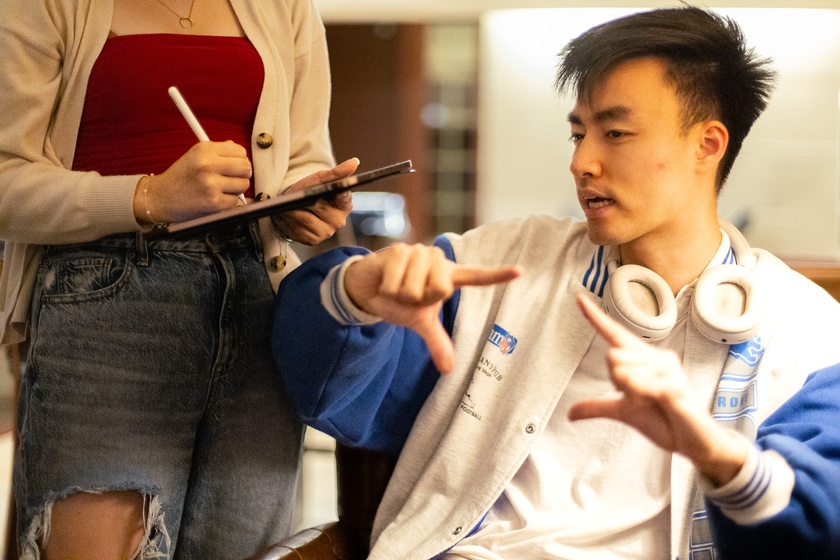{shortcode-a01bfd327e9fb867bf219e5f82c30fec0137a863}
{shortcode-8c0dd475ea3269f67b1a4d37d27db5cc232a1fc2}esley Wang ’26’s reputation precedes him.
He co-founded a nonprofit before middle school, became a chess FIDE Master in 2018, and opened for Nicky Youre at last year’s Crimson Jam. However, he is best known for writing and directing “nothing, except everything.,” a short film that went viral on YouTube last fall and won the Grand Jury Prize at the Indy Shorts International Film Festival. Still, he tries to avoid introducing himself as a filmmaker.
“I kind of just let people figure it out on their own,” he says.
One of Wang’s classmates, sitting at the other end of our table in the Science Center Café, disagrees with a laugh. “When I first met him, he said, ‘I’m a filmmaker.’”
Wang started making films as a creative outlet when he was just 11 years old. In his early movies, he cast his father and brother as the main characters and paid for production costs by teaching chess lessons.
Gradually, Wang’s creations became more elaborate. His most recent short film “nothing, except everything.” is a far cry from those early projects. Filmed while Wang was still in high school, it involved over a dozen cast members and a crew of more than 30 people.
“To start off this project, I literally cold-emailed 200 different producers,” Wang says. He eventually teamed up with Oscar-shortlisted producer Scott Aharoni, who boosted the film’s credibility and brought aboard acting stars David Mazouz and Lily Chee.
“nothing, except everything.” quickly took off on social media, gaining 3.7 million views on YouTube in the span of a few months. “You never expect anything to go viral,” Wang told me, “although I did know for a fact this one was going to do better than my other ones.”
Virality brought a flood of attention to the project, with YouTube users commenting praise like “a rare example of perfect cinematography and storytelling” and “it literally changed me after I watched it.”
At the same time, the film received significant anonymous hate, particularly on the review platform Letterboxd. In the most popular viewer comment, one user called the film the “most vapid attempt at intellectualism ever formed,” ridiculed its montage-based storytelling as “everything putrid and offensive about 21st century Generation Z filmmaking distilled into a repulsive short,” and even went so far as to call Wang the “antichrist with a camera.” Other commenters similarly criticized the heavy-handed flashy visuals and quasi-philosophical monologues. More than a few honed in on Wang’s status as a Harvard student, arguing that his privileged background granted a level of popularity that was unearned.
A few days after our initial interview in the Science Center, I interrupt Wang during a game of hand-and-brain chess to ask him about this criticism.
“The experience was very cool in the sense that at least people are willing to talk about it a lot,” he says slowly, as if weighing each word. His storytelling approach was irregular, Wang acknowledges, but it was also intentional — he wanted to stylistically blend the “modern content that we see on TikTok and Instagram” with the medium of film. He says he’s glad the film “is generating controversy-slash-conversation around what a movie can be.”
Still, Wang is frustrated by the hate that came from assumptions made about his character and background, telling me that “a lot of it’s not true.” While he recognizes how fortunate he is to have resources and connections, he clarifies that networking is not just about privilege or luck.
“A lot of it is knowing how to pitch yourself,” he says, “which at some point is an art of itself.”
Right now, Wang is putting that skill to work as he undertakes his first feature film: a science fiction expansion of the story he first explored in “nothing, except everything.” The project is being produced by Darren Aronofsky ’91, the Oscar-nominated director of “Black Swan” and “The Whale,” who reached out to Wang after seeing the short. The two are currently pitching Wang’s movie concept to major studios.
Wang tells me about these high-stakes pitch meetings with top executives over lunch at the Science Center Café. He sits with a Clover to-go box in front of him, but he seems too excited with talking to take a bite. “It’s been a ride,” he says when asked what it’s like to attend school amidst his career take-off. “That’s hard, definitely, to maintain — to keep my grades up, at least.”
Interestingly, there isn’t much crossover between Wang’s career and his classes. Wang says he decided to concentrate in economics instead of film because he “was lucky enough to have the technical background and a lot of the connections that you would usually need for filmmaking.”
He laments that many creators “write all day, but they don’t have anything to write about.” To avoid this fate, Wang treats his academics as an opportunity to learn about relationships and “how the world works.” His wide-ranging curiosity is immediately clear: during our conversation, he quotes J.J. Abrams, pulls up a recent neuroscience article on his phone, and goes on a surprisingly detailed tangent about the relationship between academia and industrial technology research. The script idea he’s currently pitching came from conversations he had with friends about simulation theory and the Boltzmann brain thought experiment.
Of course, writing and directing a feature film is just the start. Once he’s made a few full-length films to establish his reputation in the industry, he hopes to expand to other art mediums and build an entertainment company that addresses the way artificial intelligence is changing the film industry.
At 19, though, Wang is thrilled by the work he’s doing right now. “I’m definitely where I want to be.”


